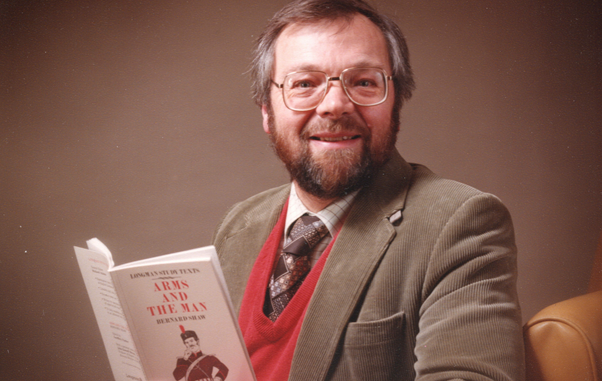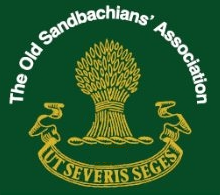
It is with much sadness that we learnt recently of the death of Nigel Johnson, former Head of English. Nigel taught at the school from 1973 – 1983. He inspired many boys through his love of literature and genuine interest in helping individuals achieve their potential. You can read a moving obituary from Duncan McCargo below.
Our condolences go out to his family. He is fondly remembered by many Old Sandbachians.
Obituary: Nigel Johnson
1934 – 2021
By Duncan McCargo
Professor of Political Science at the University of Copenhagen
Sandbach School 1974-1981
For reasons I never understood, in 1977 the Head of English at Sandbach, Nigel Johnson, took a shine to an awkward third-former. He nurtured my interest in literature, and encouraged me to apply for English at university, one of the best decisions I ever made. The confidence Nigel placed in me may well have changed my life.
Nigel died aged 86 in November 2021. Over a 30-year career, he taught English at schools in Peterborough, Anglesey, Germany and Cheshire, always remarkably dedicated to trying to bring out the best in his pupils.
Nigel was born in Scarborough, where his father Cecil Johnson owned a women’s clothes shop. After attending Scarborough High School for Boys, he did his national service in the Royal Navy.
He had cheated on the initial navy eye test by listening to other people’s answers as he sat in the queue outside, but was soon rumbled during a second test, and though he was admitted to the service he was never posted to sea, instead running a library at a naval base near Nuneaton. After national service he did a general arts degree at Durham University, where he was an avid rower, and followed up with a diploma in education.
Graduating in 1960, he embarked on a career as an English teacher, beginning in Peterborough where he taught at Deacon’s School (now Thomas Deacon Academy), before becoming Head of English at HMS Conway, a naval boarding school in Anglesey, where he spent his free time sailing a dinghy on the Menai Straits. There he taught, among others, the future rugby coach Clive Woodward and future Conservative party leader Iain Duncan Smith.
Although life in Angelsey was idyllic, Nigel soon got itchy feet and applied for a job with the British Forces Education Service. Instead of the dreamed-of Cyprus or Malta, in 1970 the Johnsons were dispatched to Cornwall School in Dortmund.
In 1973 Nigel moved to Sandbach School, staying there for 10 years and producing annual school plays of a high standard: a highlight was Ibsen’s The Wild Duck, staged for the school’s 1977 tercentenary celebrations. Nigel took time to see the potential in students that others might have missed: I was one of many young people whose lives he changed for the better.
In 1983 he took another post at Grange School in Hartford, and in 1990 he decided to take early retirement, aged 55.
Nigel then moved to the Cornish coast. Inspired by John Hodgson, a former Sandbach colleague who had already retired to the area, he became a devoted sailor and spent the next 20 years messing about in boats, occasionally crossing the Channel to Brittany.
When I last met up with Nigel in Falmouth in 2019, for the first time in over thirty-five years, he told me regarded his decade at Sandbach as the culmination of his career. As Nigel explained in his memoir, he also thought he’d been rather lucky to get the job: at the interview, he had the support of Cecil Rigby, the strong-willed chair of governors, but was viewed with suspicion by headmaster John Bowles, ‘who did not trust men with beards who had worked abroad’. In the end, Mr. Rigby, impressed by Nigel’s military credentials, prevailed. However, Nigel soon came to believe that two of his close colleagues were far from happy: Geoff Hancock, almost twenty years his senior, who had previously been Head of English and was subsequently demoted; and Mike Gresty, who probably thought he should have got Nigel’s job.
Sadly, none of these other gentlemen is around to give their own accounts of exactly what transpired back in 1973. I corresponded with John Bowles for a few years after I left Sandbach in 1981, and I believe that whatever his first impressions, he later came to appreciate Nigel’s irrepressible charm, energy and dedication. Despite their clashing personalities, Cecil Rigby and John Bowles shared a common determination to raise academic standards at Sandbach School. With his Durham degree and Cert. Ed., along with his considerable experience as Head of English at two previous schools, Nigel Johnson epitomised the new breed of well-qualified professional teachers who joined Sandbach in the early 1970s.
In any event, Nigel quickly won over his colleagues, partly by putting on a series of very ambitious school plays over the next decade. These included Arms and The Man (1974), The Lady’s Not for Burning (1975), My Three Angels (1976), The Wild Duck (1977), A Penny for a Song (1978), The Real Inspector Hound (1979), Hay Fever (staff play, 1981), The Government Inspector (1982) and The Physicists (1983). Whatever his initial misgivings, Geoff Hancock took care of props for Nigel’s productions, which proved a great unifying enterprise that boosted the reputation of the School.
 |
When Nigel left for the Grange School in Hartford in 1983, Mike Gresty wrote in The Sandbachian:
His gentle efficiency, cultured presence and general old-world courtesy soon won the loyalty of the Department, the friendship of the Common Room and the respect of boys throughout the school…. His unassuming demeanour and absolute commitment was in the best tradition of English teaching
Nigel remained active in retirement, volunteering at the National Maritime Museum, Falmouth, and compiling a volume of poems, People and Places, and a memoir, The Time of My Life. He was full of fun and curiosity and always wonderful company.
Nigel is survived by his wife Gill, his first wife Ann, his daughters, Sarah, Emma and Rachel, and eight grandchildren: Oliver, James, Joseph, Anna, Sophie, Thomas, Marianne and Christian.
Duncan McCargo
Professor of Political Science at the University of Copenhagen
Sandbach School 1974-1981
This article has also appeared in The Guardian.
Reproduced by kind permission of the author.
Jeff Lewis, Secretary, Old Sandbachians’ Association, writes…
Nigel was due to attend the RAF Club event at London in 2020. Due to Covid, this was postponed and Nigel and fellow pupils were sadly unable to reminisce together, but, as witness the comments on our Facebook Page, his memory and influence live on in the students he taught.
Andy Stone
An excellent English teacher, whom I was privileged to have been taught by. RIP Mr Johnson.
Brent Pickering
That is sad news – a real gentleman able to pass on his love for literature. As one of his innumerable former pupils, i always found his lessons and his friendliness a pleasure. My sincere condolences to his family. RIP Mr Johnson.
Paul Drage
Very sad news. I was never taught by him, but I Stage Managed for several plays with him over my last few years at Sandbach. I’m still involved with theatre to this day thanks to his enthusiasm.
Jonathan Cowap
Very sorry to hear this sad news. He was a kind, considerate and inspiring gentleman. He gave me an opportunity to play a small part in Ibsen’s The Wild Duck. My opening line was “Molvik thought he could smell herring salad and then there was no stopping him..” Mr Johnson’s influence changed the course of my life – and the lives of many others – for the better. That’s a legacy. A fine man.
Tony Bartley
My first ahead of Department, a lovely chap
Stephen Brown
A lovely teacher and a kind man. I loved his classes, remember working through “Sons And Lovers” and “The Cocktail Party” with him for A level, plus “The New Poetry” as an intro to poetry in general. Good natured, always had time for us. One of the best.

